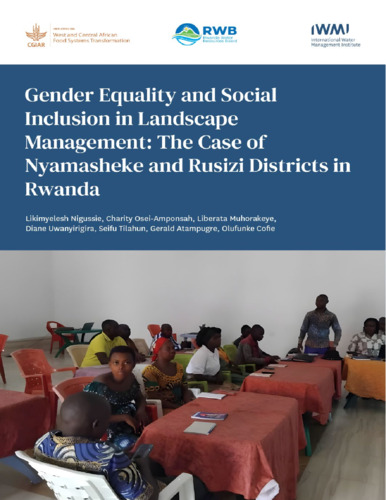Gender equality and social inclusion in landscape management: the case of Nyamasheke and Rusizi districts in Rwanda
Abstract
Gender Equality and Social Inclusion in agriculture and natural resource management is crucial for addressing climate change and land degradation. In Rwanda, laws and policies support gender equality and environmental sustainability. Despite efforts to involve both genders in decision-making, power dynamics persist, impacting landscape management priorities, knowledge valuation, resource rights, benefits distribution, and decision processes. This study investigates the interplay between gender and multiple identities, including marital status, socioeconomic status, and age, alongside power dynamics. It emphasizes how these factors affect rights to resources, the transfer of knowledge and skills, and the impact on participation in decision-making processes which are essential for effective landscape management in the Rubyiro Sub-Catchment located in Rwanda's Rusizi and Nyamasheke districts. It is a qualitative study based on data gathered in May and June 2024 using eight key informant interviews (four men and four women), 20 household interviews (ten men and ten women), and eight focus group discussions (four with men groups and four with women groups). The results suggest that the Government of Rwanda has put in place legal frameworks to advance environmental sustainability, gender equality, and sustainable development. However, the experiences of farmers, regardless of gender, highlight that age, gender, socio-economic conditions, and power relations significantly impact their rights to resources, their capacity to voice opinions, and their representation in landscape management, thereby affecting its effectiveness. The following are the three primary key results and recommendations.
• The study reveals that both genders, particularly younger men, and women from resourcepoor households, face limited access to resources like land, water, and financial support due to poverty and patriarchal cultures. This leads to unsustainable practices, limited economic opportunities, and limited eco-friendly livelihoods. Addressing these challenges requires interventions that focus on the needs, priorities, barriers, and challenges of the diverse social groups, and ensure access to resources and services, and benefits.
• Male heads in households often control information, creating a gender and generational gap in ecological knowledge. Gender disparities in priorities and knowledge also exist in landscape management, with women prioritizing adaptive strategies for food security and men prioritizing economic gains over sustainability. To effectively address the gender gaps in ecological knowledge in the context of landscape management, it is vital to pursue inclusive educational and communication strategies. This includes organizing community workshops that cater to men and women from diverse social group, focusing on the food security priorities of women, and creating platforms for dialogue across generations. Moreover, it is necessary to establish gender-sensitive policies and harness technology to facilitate the broad dissemination of information.
• The research also reveals significant differences in leadership roles and decision-making between men and women, due to patriarchal norms and economic challenges. Women are underrepresented in conservation decision-making due to domestic duties and poverty, further marginalizing their voices. Limited involvement of women, men, and youth from diverse social groups in landscape management decision-making processes perpetuates cycles of poverty and poor resource use. We recommend adopting interventions that address the barriers to enhance equitable participation in leadership positions, while promoting gender-sensitive practices and fostering collaboration.

